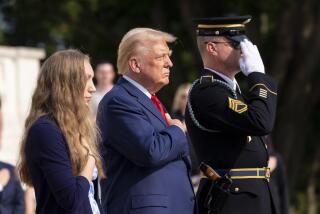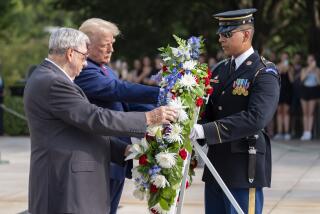Germans Decry Bitburg Furor : Bonn Aide Calls on U.S. Churchmen to Support Visit
BONN â Bitterness grew in West Germany on Monday over attacks on President Reaganâs plan to visit a German military cemetery, and a Foreign Ministry official called on American clergymen to defend the trip.
In addition, newspapers warned of the effect of the controversy on U.S.-West German relations, and government officials decried what they called false information about the visit.
Alois Mertes, the member of Parliament for Bitburg and a state secretary in the West German Foreign Ministry, said Roman Catholic bishops in the United States should support Reaganâs visit to the cemetery.
âI ask where the Catholic Church and other churches are in this debate,â he said in a radio interview Monday, âespecially the U.S. Catholic bishops, who have plenty to say about strategic and economic issues but have not brought the joyful news that Godâs blessing also extends to the buried SS soldiers.â
He added: âA grave is a grave. Allowing the dead to rest in peace is a basic principle of our Christian-Judeo civilization.â
Chancellor Helmut Kohlâs hope that Reaganâs stop at the Bitburg cemetery would help seal the reconciliation between the former enemies has instead erupted into a major controversy, tearing open old wounds. West German leaders have been clearly stunned by the intensity of the reaction, but Kohl has staunchly stood by the visit.
At a news conference Monday, government spokesman Peter Boenisch labeled as âscandalousâ references in the international press to Bitburg as a âNazi city.â
Boenisch read a plea to Kohl, signed jointly by Bitburg Mayor Theo Hallet and Rhineland Palatinate Premier Bernhard Vogel, to counter what they see as the defamation of the town.
âMake it clear to the world public (that) in Bitburg live people who resisted Nazism as hardly any other city, (and that) in Bitburg people live who have had friendly ties as hardly any other city for decades with thousands of American soldiers living here,â the appeal said.
The U.S. Air Force 36th Tactical Fighter Wing is based nearby.
State Secretary Mertes has released figures showing that the staunchly Roman Catholic Bitburg constituency gave a lower percentage of its vote--14.7%--to the Nazi Party than any other city in prewar Germanyâs last free election in 1932.
The controversy has centered on the presence of 49 graves of Waffen SS troops among the 1,887 World War II dead, mostly teen-age draftees, buried at Bitburg. The Waffen SS was a combat branch of Hitlerâs elite force, a separate branch of which ran Nazi concentration camps.
Boenisch, calling irrelevant the presence of one SS grave for every 39 of those of regular soldiers, said: âEven if someone who is lying there was guilty of anything, there is no worse punishment than death.â
Jewish communities in the United States and other countries have expressed outrage, charging that Reaganâs plans to lay a wreath at the cemetery is tantamount to honoring those who carried out the Holocaust.
Assurances that the wreath will be laid far from the few SS graves and changes in Reaganâs itinerary to include a stop at the Bergen-Belsen concentration camp memorial have failed to dampen the controversy.
West Germans, who make sharp distinctions between the SS concentration camp units and the SS combat divisions to which those buried at Bitburg belonged, have taken the controversy as a national insult.
In a public opinion poll to be released today, West Germans were asked if they viewed those buried at Bitburg as Germans or Nazis, and 94% answered Germans.
âThis goes to the heart of every family,â said Elisabeth Noelle-Neumanan, who heads the Allensbach Opinion Research Institute that conducted the poll. âIn almost every (German) living room there is a picture of someone who died in the war.â
The reaction is also a severe setback for a country that has strived so hard for international acceptance since the war.
The respected Frankfurter Allgemeine Zeitung said in a front-page commentary that the Bitburg controversy is âa trauma that wonât be soon forgotten.â
The commentary exuded disillusionment and talked of Washington giving Japan respect while âtreating its most loyal European ally as a vassal.â
âThere has been clumsiness on both sides, but the reaction has been immoderate and hysterical,â the newspaper said. âThe U.S.A. should be aware of growing anti-Americanismâ that could be fueled by the controversy over Bitburg.
The Bonner Rundschau newspaper said the planned cemetery visit has âcreated hysteria without end.â
Kohl also warned about possible lasting damage to U.S.-West German relations, saying he hoped this would not happen either on a governmental or personal basis. But if it did, he added in a magazine interview, âthen we would have to ask ourselves whether or not we have been building (relations) on sand these past decades.â
At his news conference, government spokesman Boenisch hinted at a possible expansion of Reaganâs state visit program but insisted the cemetery trip will not be canceled.
âI assume individual parts of the program will remain unchanged,â he said. âWe are going to complete what we said we would do in the first place.â
More to Read
Sign up for Essential California
The most important California stories and recommendations in your inbox every morning.
You may occasionally receive promotional content from the Los Angeles Times.










